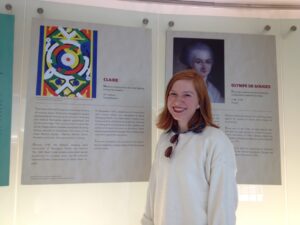This is a post by Claire Marcil, Rutgers Class of 2018, and a student worker at Margery Somers Foster Center, Douglass Library.

I began working at the Margery Somers Foster Center in the fall 2015 with the expectation of sitting at the front desk playing Solitaire all day.
On my first day of work, I was asked if I would be willing to help with the transcription of video and oral interviews with Rutgers alumni. The project sounded interesting (and much more fun than sitting listlessly at a desk for hours on end), so of course I agreed. I didn’t come in with any expectations for the project, or for what I would get out of it. To me, it was just something that I was getting paid to do. But as soon as I started transcribing, I was hooked. The interviews are absolutely fascinating. Listening to the life stories of students who graduated long ago (some nearly 90 years ago!) and the obstacles that they had surpassed is incredible. Hearing them speak with such positivity, no matter the discrimination or hardships they faced, is so inspiring and is one of my favorite parts of transcribing. However, what I enjoy most of all is hearing about their lives after college. One of the earlier graduates, after working as a teacher for 30 years, decided to spend her retirement traveling around the world, and at the time of her interview had visited every single country, save a handful. Another alumnae worked as a dietician until World War II began, then joined the military and was sent over to Europe, where she was made head of her outfit’s hospital unit (and given two assistants!). These stories are perhaps even more important than those about life at Rutgers because of their historical significance. A woman in charge of a military unit in the 1940s! Who would’ve guessed? Without these interviews, the rich history that these students lived through would be lost, and our ideas about the past much more inaccurate. Transcribing the interviews has been such a rewarding experience, and I’m so thankful to be a part of recording history.
Working at Douglass, I have also had the opportunity to both design the layout of and help install a museum exhibit. As an student of anthropology, the opportunity to get a bit of experience with the process of showcasing a an exhibit has been invaluable. We received over a dozen panels for an exhibit on Women and Slavery from the United Natons and chose to hang them in the rotunda at the front of the library, which was no easy feat. The first method we tried to hang the panels did not work, so we had to think outside the box – and ask for some expert advice – in order to display them. Though frustrating, the experience taught me that sometimes, you might have to employ some extra creativity to get the job done, and that it’s ok to ask for outside help. It was a really cool learning experience and has sparked my interest in museum exhibit design and curation (I plan on volunteering at the Rutgers Geology Museum next semester!). Overall, working at the Douglass Library has given me some extraordinary opportunities that I am forever grateful for. I truly love coming to work each day.